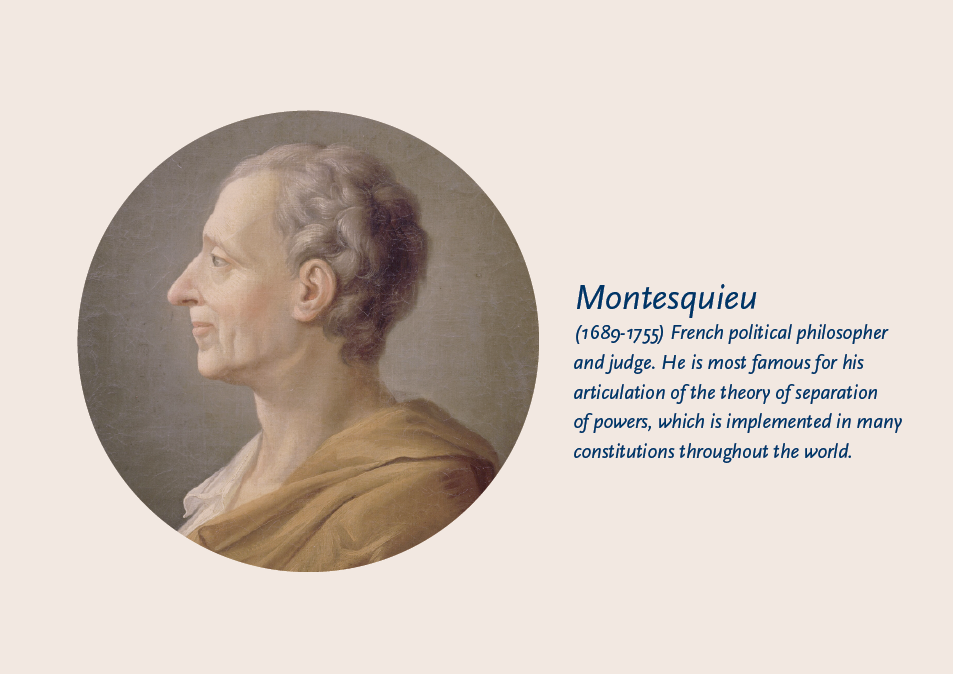Montesquieu

Since the educational spaces in our faculty have all been named, we would like to tell about the background of the elected jurists and cases. Through a series of blogs we want to make the names come to life and show that our building houses a legal faculty. After all, not everyone knows all the ins and outs of these persons and cases. What makes them so special? Several colleagues will talk about these individuals and cases in the coming months. In this second edition you can read all about Montesquieu.
Carles Louis de Secondat, Baron de la Brède et de Montesquieu, was born in the castle La Brède, a small village south-east of Bordeaux, in 1689. After having studied law, he inherits in 1716 not only his estate but also the presidency of the Bordeaux ‘Parlement’, which administered the region. In 1720 he wrote his first book (Lettres Persanes), a book of fiction, but still containing criticism of French absolutism as it then prevailed. A precursor to what is to become the main theme in his famous later work ‘De l’Esprit des Lois’, published in 1748, 7 years before his death.
In the meantime he sold his Presidency and was admitted to the Académie Francaise. He travelled to Italy and importantly to England, where he discovered what he missed in France: tolerance, freedom and a fair public life. And these aspects impacted his analysis of the separation of powers, as a tool against abuse of power and the corruption of absolute power. The foundation for his analysis and conclusion is the English constitutional system, from which alleged description flowed the idea of separation of powers.
He was a comparative constitutional lawyer: he studied constitutional systems and categorized them in three systems: despotism, republic and the constitutional monarchy as it was developing itself in England. In that aspect, although the book is about many more things, it has had an immense impact on constitutional law. The notion that a constitutional monarchy, fitting well with a differentiated society, ought to separate the three state functions (lawmaking, executing the laws and conducting foreign policy (to be assumed by the monarch by the way) and the exercise of judicial tasks) over three separate branches of government.
Why? To prevent all powers to remain in one hand and to avoid abuse of power, and specifically to avoid despotism. Was this visible in the UK in those days? Not really. But indeed, with the growth of the powers of parliament and the gradual notion of the supremacy of parliament, he defined that the English system ensured the absence of arbitrariness since it was a system under the rule of law, that is generally applicable laws. Power has to stop power.
He innovated the exercise of constitutional law since he claimed to develop his theory from a description of what he saw; and even though the description was less than accurate, the prescription of power which has to stop power, of the need to prevent the abuse of power and to end absolute power, is the fundamental law of constitutionalism. Even though we know by now that many more and other mechanisms may exist and be developed to limit the exercise of power, for instance less by separation but by forcing different actors to collaborate, we see what occurs if one party or one person amasses too many powers and is not controlled in the exercise of it. We may call it how we want: a violation of the rule of law, or despotism, or arbitrariness, or a violation of democracy and equality, or abuse: we need mechanisms to instil restraint, scrutiny and limitations upon any public authority. Practice shows us today that as history has taught us repeatedly, power holders seek to increase their powers and seek continuously to abolish mechanisms of control.
Montesquieu pointed us the way in a period of an absolute monarchy in France. Let us never forget the lesson for students of the law and lawyers to always strive for the limitation and control of those in power and to ensure the full respect of and compliance with equality, absence of arbitrariness, public scrutiny, accountability of those in power, legality of public decisions and limited power.
| More blogs on Law Blogs Maastricht |